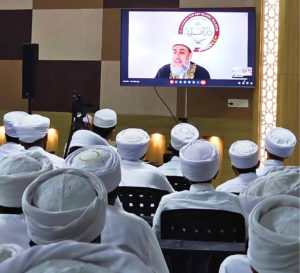There are two reasons why what is in Sahih Muslim is not authentic, which is that a man came to the Messenger of Allah and asked him about a slave woman of his; the man said, “I said, ‘O Messenger of Allah, should I free her?’ He said ‘Bring her to me’, so he brought her to him. Then he said to her, ‘Aynallah?’ She said, ‘Fis-sama’.’ He said, ‘Who am I?’ She said, ‘You are the Messenger of Allah.’ He said, ‘Free her, for she is a believer.’” [The first is] because of inconsistency [idtirab], since it was narrated with this expression and also with the expression: “‘Who is your Lord?’ She said, ‘Allah,’” and with the expression “‘Aynallah’, and she pointed to the sky,’” and with the expression, “‘Do you testify that no one is God except Allah?’ she said ‘Yes,’ he said, ‘Do you testify that I am the Messenger of Allah?’ She said, ‘Yes’.
The second issue is that the narration of “Aynallah” is against the known Rules of the Religion, because among the basic Rules of the Religion is that a person is not judged with Islam because he said, “Allah is in the sky,” for this saying is shared by Jews, Christians and others. Rather, the known rule in the Religion of Allah is what came in the mutawatir hadith:
أُمِرْتُ أَنْ أُقَاتِلَ النَّاس حَتى يَشْهَدُوا أَنْ لا إِلهَ إِلّا اللهُ وَأَنّي رَسُولُ اللهِ
[which means] “I was ordered to fight the people until they testified that no one is God except Allah, and that I am the Messenger of Allah,” and the expression of Imam Malik in which he asked the girl, “Do you testify that no one is God but Allah?” is in compliance with the known Rules of the Religion.
If it were said, “How would the narration of Muslim, ‘“Aynallah?” She said, “Fis-sama’,”’ until the end of the hadith, be rejected, despite that Muslim narrated this hadith in his book, and everything that is narrated by Muslim is described with authenticity?”, the answer is that there is a number of hadith in Muslim that have been rejected by the scholars of hadith, and they mention them in their books. An example is the hadith that the Messenger said to a man, “My father and your father are in hell.”[1] Also rejected is the hadith that every Muslim on Judgment Day will be given a sacrifice among the Jews and the Christians. Likewise is the hadith of Anas, “I prayed behind the Messenger of Allah, and Abu Bakr and ^Umar, and they used to not mention Bismillahir-Rahmanir-Rahim.” The first hadith was weakened by Hafidh As-Siyutiyy, the second hadith was rejected by Al-Bukhariyy, and the third hadith was weakened by Ash-Shafi^iyy and a number of Hafidhs.
The apparent meaning of this [narration of the] hadith [of the slave girl] is invalid because it is in conflict with the aforementioned mutawatir hadith, and anything that opposes what is narrated by tawatur is invalid if it does not accept a ta’wil[2]. The scholars of hadith and Usul have agreed upon that. However, some scholars have made a ta’wil for the hadith of the slave girl, which is that they said the meaning of “aynallah” is a question about her glorification of Allah, and when she said “fis-sama’,” she meant “He has a very high status.” As for taking it by its literal meaning, to say that Allah lives in the sky, this is invalid and rejected. It is confirmed in the knowledge of hadith terminology that whatever goes against what is narrated by tawatur is invalid if it does not accept a ta’wil, and certainly the apparent meaning of [this narration of the] hadith of the slave girl is corrupt because the apparent meaning of this hadith is if the blasphemer says Allah is in the sky, he is judged with belief.
[1] As-Siyutiyy rejected this hadith, because either the Prophet’s ﷺ parents were believers or they were not accountable. This hadith is against the known rules; that the ones who died before the Prophet ﷺ received the Message are not accountable.
[2] In this context, explaining a text by other than its apparent meaning.





